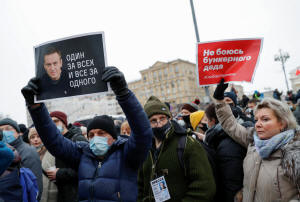EU to debate Russia sanctions after Navalny protest arrests
 Send a link to a friend
Send a link to a friend
 [January 25, 2021]
BRUSSELS (Reuters) - The European
Union will consider fresh sanctions on Russian individuals on Monday
after more than 3,000 people were arrested across Russia on Saturday to
demand the release of Kremlin critic Alexei Navalny. [January 25, 2021]
BRUSSELS (Reuters) - The European
Union will consider fresh sanctions on Russian individuals on Monday
after more than 3,000 people were arrested across Russia on Saturday to
demand the release of Kremlin critic Alexei Navalny.
Lithuania's foreign minister, arriving in Brussels for a meeting of the
bloc's 27 top diplomats, said "a change is in the air in Russia" that
the bloc must support, especially after Navalny's detention as he
returned to Russia from Germany.
"The EU needs to send a very clear and decisive message that this is not
acceptable," Gabrielius Landsbergis said in a video statement, calling
for more sanctions on Russian individuals.
The EU already has economic sanctions on the Russian energy, financial
and arms sectors over its 2014 annexation of the Crimea peninsula and
has imposed sanctions on Russian officials close to President Vladimir
Putin in response to Navalny's poisoning in August.

Fellow Baltic countries Latvia and Estonia support more EU sanctions on
Russian individuals, and Italy's foreign minister said on Sunday that
Rome was ready to support more travel bans and asset freezes. Romania
publicly backed sanctions on Monday.
German Foreign Minister Heiko Maas demanded the immediate release of
protesters who braved extreme cold to call for Navalny's release, but
did not make further comment.
In central Moscow on Saturday, where Reuters reporters estimated up to
40,000 people had gathered in one of the biggest unauthorised rallies
for years, police were seen roughly detaining people, bundling them into
nearby vans.
[to top of second column]
|

A man holds a placard reading "One for all, all for one" during a
rally in support of jailed Russian opposition leader Alexei Navalny
in Moscow, Russia January 23, 2021. REUTERS/Evgenia Novozhenina

Germany and France, the EU's main powers, will be central to
deciding if the bloc goes ahead with punitive measures on Russia, a
big oil and gas exporter to the bloc, although no detailed list of
names is expected to be decided on Monday.
Navalny says Putin was behind his poisoning last August, a version
that the Kremlin rejects. The Kremlin says it has seen no evidence
that Navalny was poisoned and that it will not heed calls by some
Western countries for sanctions over Navalny's detention because his
case is a domestic matter.
Finnish Foreign Minister Pekka Haavisto said he wanted a "proper
legal investigation" in the poisoning.
(Reporting by Robin Emmott; editing by Foo Yun Chee, William
Maclean)
[© 2021 Thomson Reuters. All rights
reserved.] Copyright 2021 Reuters. All rights reserved. This material may not be published,
broadcast, rewritten or redistributed.
Thompson Reuters is solely responsible for this content.
 |